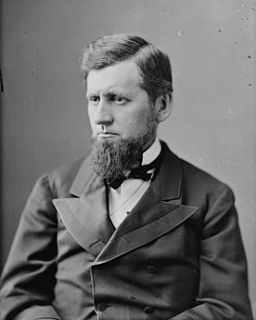
Daryl Beall is an American politician. He was the Iowa State Senator from the 5th District. A Democrat, he served in the Iowa Senate from 2003-2015, in Iowa Senate district 25 before Iowa's 2012 redistricting. He received his A.A. from Iowa Central Community College, his B.A. from Buena Vista University, and his MPA from Drake University.

The 2006 Iowa Senate election was held on November 7, 2006. The Senate seats for the twenty-five odd-numbered districts were up for election. Senate terms are staggered such that half the membership is elected every two years. Senators serve four-year terms. Prior to the election, the Senate was evenly divided between Republicans and Democrats. Following the election, the Democrats were in the majority - this marked the first time in 42 years that the Democrats had controlled both branches of the Iowa General Assembly and the Governor's Office.

There were two sets of 2006 Iowa House of Representatives elections. The first, the general election, was held on November 7. The second, a special election for District 52, was held on December 12. The representatives-elect from both sets of elections were inaugurated on January 3, 2007. The Iowa House, like the United States House of Representatives, is up for re-election in its entirety every two years. Prior to the elections, the Republicans were in the majority; following inauguration, the Democrats were in the majority – this marked the first time in 42 years that the Democrats had controlled both branches of the Iowa General Assembly and the Governor's Office at the same time.

The 2008 Iowa House of Representatives election were held on November 4, 2008. The Iowa House, like the United States House of Representatives, is up for re-election in its entirety every two years. Prior to the election, the Democrats were in the majority - this marked the first time in 42 years that the Democrats had controlled both branches of the Iowa General Assembly and the Governor's Office. Democrats retained this majority following the 2008 elections.

The 2008 Iowa Senate election were held on November 4, 2008. The Senate seats for the twenty-five even-numbered districts were up for election. Senate terms are staggered such that half the membership is elected every two years, with each Senators serving a four-year term. Prior to the election, the Democrats were in the majority - marking the first time in 42 years that the Democrats had controlled both branches of the Iowa General Assembly and the Governor's Office. They expanded this majority by two seats in the 2008 elections.
In the United States Senate elections of 1870 and 1871, the Republican Party lost five seats in the United States Senate, though it still retained an overwhelming majority. In advance of these elections, the last four seceded states were readmitted to the Senate.
The United States Senate elections of 1872 and 1873 were elections which had the Republican Party, while still retaining a commanding majority, lose two seats in the United States Senate. By the beginning of the Congress, however, they'd lost three more: two as defections to the Liberal Republican Party, and one a resignation of Henry Wilson to become U.S. Vice President. These elections also coincided with President Ulysses S. Grant's easy re-election.
The United States Senate elections of 1878 and 1879 were elections which had the Democratic Party retake control of the United States Senate for the first time since before the Civil War.
The United States Senate elections of 1882 and 1883 saw the Republicans retain a narrow majority — 39 out of 76 — with the Readjusters in their caucus.
The United States Senate elections of 1884 and 1885 were elections that coincided with the presidential election of 1884. Both Republicans and Democrats lost seats in the United States Senate due to the failure of three state legislatures to finish elections in time. Republicans, nevertheless, retained majority control and the Readjusters joined their caucus. By the beginning of the first session, in December 1885, Republicans had won all three vacant seats, increasing their majority.
The United States Senate elections of 1888 and 1889 were elections that coincided with Benjamin Harrison's victory over incumbent President Grover Cleveland. Both parties were unchanged in the general elections, but later special elections would give Republicans an eight-seat majority, mostly from newly admitted states.
The United States Senate elections of 1890 and 1891 were elections in which the Republican Party lost four seats in the United States Senate, though still retaining a slim majority. That majority was increased, however, upon the admission of two more states with Republican senators.

The United States Senate elections of 1906 and 1907 were elections which had the Republican Party gain three seats in the United States Senate, expanding their majority to more twice that of the opposing Democratic Party.

A general election was held in the U.S. state of Iowa on November 4, 2014. All of Iowa's executive officers were up for election as well as a United States Senate seat, all four of Iowa's seats in the United States House of Representatives, 25 (half) of the seats in the Iowa Senate, and all 100 seats in the Iowa House of Representatives. Primary elections were held on June 3, 2014.

The 2016 Iowa Senate election was held on November 8, 2016. The Senate seats for the twenty-five even-numbered districts were up for election. Senate terms are staggered such that half the membership is elected every two years, with each Senators serving a four-year term. Prior to the election, the Democrats were in the majority.

The Iowa general elections, 2016 will be held in the U.S. state of Iowa on November 8, 2016. One of Iowa's U.S. Senate seats and all four seats in the United States House of Representatives are up for election, as well as half of the Iowa Senate seats and all of the Iowa House of Representatives seats. Primary elections were held on June 7, 2016.



